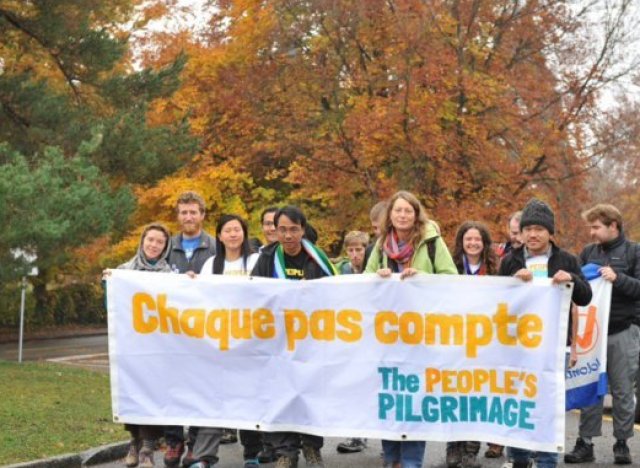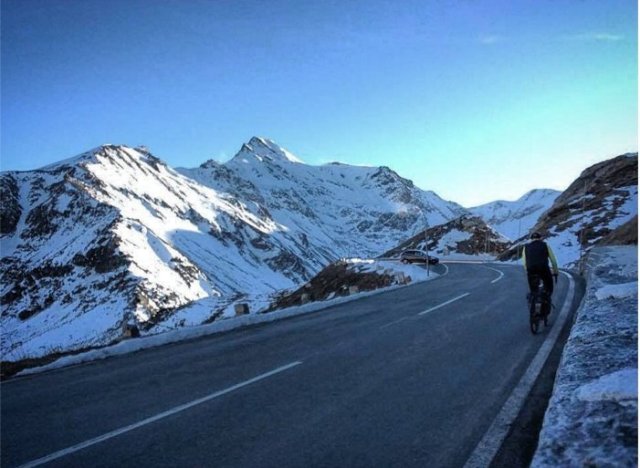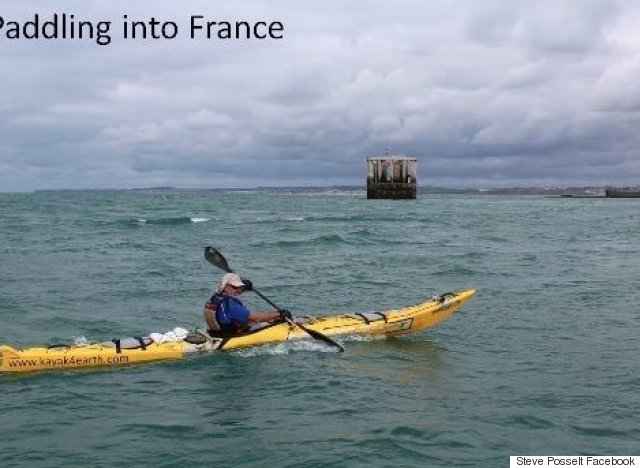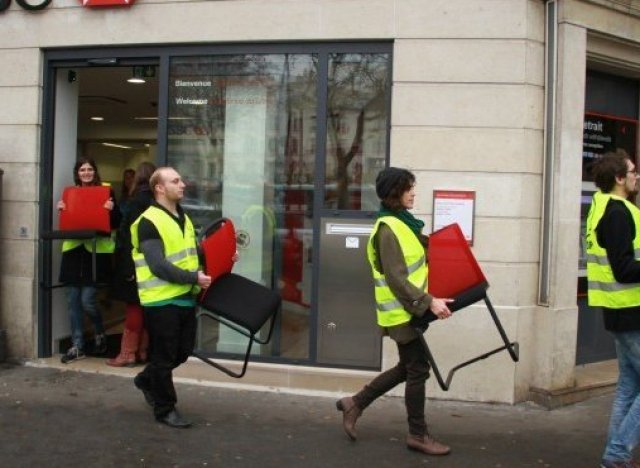France is set to host one of the most critical international meetings in the 70-year-long history of United Nations.
In two weeks, negotiators from nearly every planet on earth will be slugging it out in Paris to reach an agreement on how to fend off the deadliest consequences of global warming.
Over the past decade, scientists have become bolder in their assessment of the catastrophic fallout of climate change. They warn of extreme weather events leading to unparalleled death and destruction, severe food shortages, and millions of climate refugee.
But no matter what scientists say about the dire situation just around the corner, many people still dismiss climate change as an existential threat of the future, not worth bothering about now.
To counter this major attention deficit, some people are taking extraordinary steps to raise public awareness about why these talks are so important for the survival of the human race.
![yeb sano]()
People's Pilgrimage
Yeb Sano, the former climate change chief negotiator for the Philippines, shot to fame after he broke down in tears over the trail of devastation left by Typhoon Haiyan in his country and hometown.
While speaking at the 2013 U.N. climate change talks in Warsaw, the bespectacled and soft-spoken negotiator did not know whether his family members were alive or dead.
To raise awareness about the talks in Paris, the negotiator-turned-activist set out on a 1,500-kilometre walk, from Rome To Paris, as part of the "People's Pilgrimage" movement. "Being a person of faith, I still believe in miracles and that is what we hold onto. Maybe a miracle in Paris is still possible,” he said.
After walking across Italy and Switzerland, Sano and his group of pilgrims from different countries reached France, last week.
The "People's Pilgrimage" is a global movement which invites people of all faiths to walk, run or bike any distance of their choice to express solidarity about combating climate change.
![erlend moster knudsen]()
Pole to Paris is a combination of endeavours by two twenty-something doctors to raise awareness about climate change: the Northern Run and the Southern Cycle.
In August, Erlend Moster Knudsen, a Norwegian climate researcher, started a 3,000 kilometre long run from Tromsø, the northernmost city in the world, above the Arctic circle.
Kicking off his 17,000 kilometre long journey in Antarctica, Daniel Price, a British climate scientist, has biked across three continents since April.
The two colleagues will converge in Paris ahead of the meeting.
Price, who has a PhD in Antarctic sea ice, described the U.N. conference as the "most important meeting of modern times."
"Climate change isn’t just an environmental issue, it is an ‘everything’ issue that will change everything," he said.
Knudsen, another PhD in Arctic sea ice, explained why he is running an average of 30 kilometres a day, saddled with a backpack weighing 14 kilograms, "suffering from aching muscles and Hobbit feet, in pouring rain, eight degrees Celsius and headwind of gale force, over soggy marshes, hard asphalt and ice-cold rivers."
"I believe that we can and will act on climate change if we understand the issue. So my task is as simple as it is nearly impossible: make people realise that we have only got one planet, and that our way of living is making it sick. Sometimes I think about my unborn children and grandchildren. I want to be able to tell them that I tried my best," he said.
![steve posselt]()
Kayaking For His Grandchildren
Steve Posselt has kayaked over 8,000 kilometers from Australia to the United States and then to Europe over the past eight moths because he wants to leave behind a safe and healthy planet for his grandchildren.
The 62-year-old Australian left his hometown of Lismore in January and reached France by crossing the English Channel in October, ahead of the U.N. climate change meeting.
The Northern Star, which has tracked Posselt's journey, reported that his chosen path connects Australian bush fires, super hurricanes in the US, freezing temperatures in eastern US, flooding in the UK and the French drought.
He has reportedly faced a "flooding Mississippi, severe fog, life threatening mountainous seas, searing temperatures and prolonged rain..."
Posselt, who plans to drag his kayak to the conference, said that if he can kayak around the globe then world leaders can find the political will to fix global warming.
Speaking in the UK, Posselt apologised for the Australian governments which are "intent on increasing coal exports while sacrificing world heritage areas such as the Great Barrier Reef?"
This journey, Posselt said, is a gift to his five grandchildren.
"If only most people knew a fraction of how bad this really is for our children, we would fix it," he said.
![non violent action cop 21]()
Bank Heist In Paris
In the run up to the climate change meeting, activists of "Non Violent Action COP 21" in France are carrying out an unusual bank heist - stealing chairs.
They have "reclaimed" almost 200 chairs to protest against the money lost in tax evasions, which, they believe, can be used to combat climate change.
They also plan to use the chairs in the alternative "citizen's forum" on climate change which will run parallel to the official one.
"These chairs will support a large symbolic action to encourage citizens of the world to take action. These actions of civil disobedience will be non-violent and respect people while showing our determination to change injustice," the group said on its website.
![]() Like Us On Facebook |
Like Us On Facebook |
![]() Follow Us On Twitter |
Follow Us On Twitter |
![]() Contact HuffPost India
Contact HuffPost India
Also on HuffPost:
In two weeks, negotiators from nearly every planet on earth will be slugging it out in Paris to reach an agreement on how to fend off the deadliest consequences of global warming.
Over the past decade, scientists have become bolder in their assessment of the catastrophic fallout of climate change. They warn of extreme weather events leading to unparalleled death and destruction, severe food shortages, and millions of climate refugee.
But no matter what scientists say about the dire situation just around the corner, many people still dismiss climate change as an existential threat of the future, not worth bothering about now.
To counter this major attention deficit, some people are taking extraordinary steps to raise public awareness about why these talks are so important for the survival of the human race.

People's Pilgrimage
Yeb Sano, the former climate change chief negotiator for the Philippines, shot to fame after he broke down in tears over the trail of devastation left by Typhoon Haiyan in his country and hometown.
While speaking at the 2013 U.N. climate change talks in Warsaw, the bespectacled and soft-spoken negotiator did not know whether his family members were alive or dead.
To raise awareness about the talks in Paris, the negotiator-turned-activist set out on a 1,500-kilometre walk, from Rome To Paris, as part of the "People's Pilgrimage" movement. "Being a person of faith, I still believe in miracles and that is what we hold onto. Maybe a miracle in Paris is still possible,” he said.
After walking across Italy and Switzerland, Sano and his group of pilgrims from different countries reached France, last week.
After over 6 months journeying around the world, the #PeoplesPilgrimage arrives in France https://t.co/KwoBanUDi8 pic.twitter.com/YvAMAG4XM5
— OurVoices (@ourvoices2015) November 13, 2015The "People's Pilgrimage" is a global movement which invites people of all faiths to walk, run or bike any distance of their choice to express solidarity about combating climate change.
"Every location for a pilgrimage is personal and decided by the person or group taking part. This could be a place you know and love that is threatened by climate change, or it could be somewhere that gives you hope a solar park, or college campus taking part in divestment. Or you could visit a site which is sacred to you for prayer and meditation. What matters is that we're lifting up what climate change means to us, to put a human face on this crisis." - People's Pilgrimage.

Pole to Paris is a combination of endeavours by two twenty-something doctors to raise awareness about climate change: the Northern Run and the Southern Cycle.
In August, Erlend Moster Knudsen, a Norwegian climate researcher, started a 3,000 kilometre long run from Tromsø, the northernmost city in the world, above the Arctic circle.
Kicking off his 17,000 kilometre long journey in Antarctica, Daniel Price, a British climate scientist, has biked across three continents since April.
The two colleagues will converge in Paris ahead of the meeting.
Price, who has a PhD in Antarctic sea ice, described the U.N. conference as the "most important meeting of modern times."
"Climate change isn’t just an environmental issue, it is an ‘everything’ issue that will change everything," he said.
Knudsen, another PhD in Arctic sea ice, explained why he is running an average of 30 kilometres a day, saddled with a backpack weighing 14 kilograms, "suffering from aching muscles and Hobbit feet, in pouring rain, eight degrees Celsius and headwind of gale force, over soggy marshes, hard asphalt and ice-cold rivers."
"I believe that we can and will act on climate change if we understand the issue. So my task is as simple as it is nearly impossible: make people realise that we have only got one planet, and that our way of living is making it sick. Sometimes I think about my unborn children and grandchildren. I want to be able to tell them that I tried my best," he said.

Kayaking For His Grandchildren
Steve Posselt has kayaked over 8,000 kilometers from Australia to the United States and then to Europe over the past eight moths because he wants to leave behind a safe and healthy planet for his grandchildren.
The 62-year-old Australian left his hometown of Lismore in January and reached France by crossing the English Channel in October, ahead of the U.N. climate change meeting.
The Northern Star, which has tracked Posselt's journey, reported that his chosen path connects Australian bush fires, super hurricanes in the US, freezing temperatures in eastern US, flooding in the UK and the French drought.
He has reportedly faced a "flooding Mississippi, severe fog, life threatening mountainous seas, searing temperatures and prolonged rain..."
Posselt, who plans to drag his kayak to the conference, said that if he can kayak around the globe then world leaders can find the political will to fix global warming.
Speaking in the UK, Posselt apologised for the Australian governments which are "intent on increasing coal exports while sacrificing world heritage areas such as the Great Barrier Reef?"
This journey, Posselt said, is a gift to his five grandchildren.
"If only most people knew a fraction of how bad this really is for our children, we would fix it," he said.

Bank Heist In Paris
In the run up to the climate change meeting, activists of "Non Violent Action COP 21" in France are carrying out an unusual bank heist - stealing chairs.
They have "reclaimed" almost 200 chairs to protest against the money lost in tax evasions, which, they believe, can be used to combat climate change.
They also plan to use the chairs in the alternative "citizen's forum" on climate change which will run parallel to the official one.
"These chairs will support a large symbolic action to encourage citizens of the world to take action. These actions of civil disobedience will be non-violent and respect people while showing our determination to change injustice," the group said on its website.
 Like Us On Facebook |
Like Us On Facebook |  Follow Us On Twitter |
Follow Us On Twitter | Also on HuffPost: